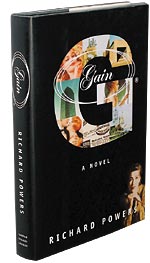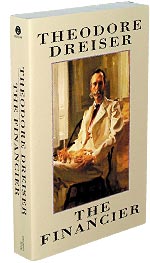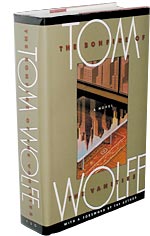Best Business Books: Business Novels
Free-Market Fiction: Three Centuries of Capitalist Characters
(originally published by Booz & Company)A curious collection of essays was published last year under the auspices of the Institute of Economic Affairs, a London-based organization dedicated to broadening the public understanding of a free economy. Titled The Representation of Business in English Literature, the collection contains a foreword by John Blundell lamenting that capitalism has received “three centuries of bad press” from writers of fiction. To demonstrate this negative bias, he works his way through the dictionary for adjectives to describe how he believes writers portray businesspeople: “…abnormal and antagonistic; corrupt, cunning and cynical; dishonest, disorderly, doltish, dumb and duplicitous; inhumane, insensitive and irresponsible; ruthless, unethical and unprincipled; and villainous to boot.”
To temper such antibusiness characterizations, Blundell proposes sending emerging writers to “a factory or similar capitalist institution” and offering financial incentives for novelists who treat business as “an honourable, creative, moral and personally satisfying way of life.” He even entertains the idea of endowing an Oxbridge Chair of Literary Capitalism.
Poor Mr. Blundell. Someone should tell him that character and conflict are the stuff of stories, and polemic is second only to unalloyed virtue in sinking a novel. Next he will be asking novelists to write about happy families!
Blundell’s free-market viewpoint is as simplistic and skewed as that of the extreme anticapitalist populists who see making money solely as a dirty game and businesspeople as ripe for vilification in fiction. In truth, beginning with Daniel Defoe, novelists have served up treatments of businesspeople and commerce that are as varied, nuanced, and complex as they are in life, resulting in an engrossing, invigorating literary genre. Unfortunately, these days, with modern readers preferring the narrowly personal or entertainingly exotic, the business-novel genre has fallen on hard times, to the detriment of not just literature but all social discourse.
Portraits of Moneymen
Novelists worth their salt have always been drawn to human behavior in all its glory and inadequacy. Take, for example, Anthony Trollope. In The Way We Live Now (1875), he created Augustus Melmotte, the best-known of all fictional businesspeople. A financier peddling shares in an American railroad scheme, Melmotte bursts on 19th-century London society with the radiance of a comet, and, as comets do, burns out. Melmotte, who eventually commits suicide, is a study in overreaching ambition, in greatness gone awry, but Trollope doesn’t make him a
figure of contempt. Melmotte, as his faithful servant Croll says, was “passionate, and did lose his ’ead; and vas blow’d up vid bigness.… ’E bursted himself.” In this story, the real villains are the amoral, gormless, prejudiced, blue-blooded fops who sneer at Melmotte while taking advantage of his prosperity. Trollope wanted to illustrate venality in all its venues, not just in the City.
 If Melmotte is a comet, then Theodore Dreiser’s nonconformist magnate Frank Algernon Cowperwood is a sun that shines steadily through an entire sequence of novels: The Financier (1912), The Titan (1914), and The Stoic (1947). Cowperwood is a corner cutter and opportunist in the Melmotte mold, but Dreiser, a journalist by training, wasn’t interested in passing judgment, or in being arch or satirical. He admired his hero, he understood his faults, and although he was awake to the social injustices of Cowperwood’s era — post–Civil War America — he couldn’t resist the cavalcade, either. His detached but vigorous reportorial style, particularly in The Financier, where the writing is the sharpest, results in an adamantine portrait of a moneyman. In no other book is the truth of Calvin Coolidge’s remark “The business of America is business” so well brought to life.
If Melmotte is a comet, then Theodore Dreiser’s nonconformist magnate Frank Algernon Cowperwood is a sun that shines steadily through an entire sequence of novels: The Financier (1912), The Titan (1914), and The Stoic (1947). Cowperwood is a corner cutter and opportunist in the Melmotte mold, but Dreiser, a journalist by training, wasn’t interested in passing judgment, or in being arch or satirical. He admired his hero, he understood his faults, and although he was awake to the social injustices of Cowperwood’s era — post–Civil War America — he couldn’t resist the cavalcade, either. His detached but vigorous reportorial style, particularly in The Financier, where the writing is the sharpest, results in an adamantine portrait of a moneyman. In no other book is the truth of Calvin Coolidge’s remark “The business of America is business” so well brought to life.
Rivaling Melmotte and Cowperwood in double-or-nothing risk taking is Octave Mouret, the pioneer department-store merchant in Emile Zola’s The Ladies’ Paradise (Au Bonheur des Dames) (1883). A marketing and public relations genius, Mouret sees himself as being in the business of creating desire. Not for him anything as plebeian, as dull, as satisfying customer needs; he wants Parisian women to swoon with covetousness.
In achieving his goal, Mouret is forcing small neighborhood businesses into bankruptcy, but Zola, while sensitive to their misfortune, doesn’t wallow in it. Instead, he uses lush, lyrical prose that mimics the dazzle of Mouret’s window displays and the sumptuousness of the piles of merchandise in his emporium. The descriptions of the sales themselves border on the orgiastic. Mouret is a triumphant creation: the ultimate seducer.
Zola strives to write “the poem of modern activity.… Don’t conclude with the stupidity and sadness of life. Instead, conclude with its continual labor, the power and gaiety that comes from its productivity.” A sample of that “poem” describes, of all things, the chute down which trucks discharge their goods in the store’s receiving department:
[The goods] were weighed and then tipped down a steep chute; the oak and ironwork of this shone, polished by the friction of bales and cases. Everything entered through this yawning trap; things were being swallowed up all the time … falling with the roar of a river. During big sales especially, the chute would discharge an endless flow into the basement, silks from Lyon, woolens from England, linens from Flanders, calicoes from Alsace, prints from Rouen.… The parcels, as they flowed down, made a dull sound at the bottom of the hole, like a stone thrown into deep water.
As he was passing, Mouret stopped for a moment in front of the chute. It was in full activity: rows of packing cases were going down on their own, the men whose hands were pushing them from above invisible; and they seemed to be rushing along by themselves, streaming like rain from some spring higher up. Then some bales appeared, turning round and round like rolled pebbles.… Never had [Mouret] been so clearly aware of the battle he was engaged in. His task was to launch this deluge of goods all over Paris.
At the turn of the century, in Tono-Bungay (1908), H.G. Wells limned another master marketer: a roly-poly chemist named Uncle Ponderevo. He concocts a quack medicine, names it Tono-Bungay, adroitly advertises it — “Are you bored with your Business? Are you bored with your Dinner? Are you bored with your Wife?” — and makes a fortune. His nephew, George, joins him in the enterprise and discovers the satisfaction that can be found in making a business “hum.” Muses George, “It sounds wild, I know, but I believe I was the first man in the city of London to pack patent medicines through the side of packing cases [to prevent breakages], to discover there was a better way in than by the lid.”
A dabbler in socialist politics, George is not without his qualms and tells his uncle that Tono-Bungay is “a damned swindle … selling the cheapest thing possible in the dearest bottle.” Uncle Ponderevo rebuts him: “I’d like to know what sort of trading isn’t a swindle in its way. Everyone who does a large advertised trade is selling something on the strength of saying it’s uncommon.… It’s the modern way! … The point is, George, it makes trade. And the world lives on trade. Commerce! A romantic exchange of commodities and property. Romance. ’Magination. See?” As he prospers, Uncle Ponderevo makes the transition from commerce to finance, from humble abodes to ever-bigger mansions, and in such excesses lies his downfall. Like Melmotte, he “bursted himself.”
Flawed though they might be, Melmotte, Cowperwood, Mouret, and Uncle Ponderevo have reserves of energy and drive, a capacity for self-invention and outsized dreams, an ability to cut to the chase and gauge the future. Uncle Ponderevo puts it best when, early in Tono-Bungay, he says of the inhabitants of the sleepy village where he has a pharmacy, “But Lord! They’ve no capacity for ideas, they don’t catch on; no Jump about the place, no Life. Live! — they trickle.… It doesn’t suit me.… I’m the cascading sort.”
One could continue in this vein through the 20th century. Some outstanding novels containing businesspeople who spill over with an abundance of ambition: Sinclair Lewis’s Babbitt (1922); Upton Sinclair’s Oil! (1927); Christina Stead’s House of All Nations (1938); Frederic Wakeman’s The Hucksters (1946); Sloan Wilson’s The Man in the Gray Flannel Suit (1955); John Braine’s Room at the Top (1957); and Louis Auchincloss’s The Embezzler (1966). These writers might have been making larger statements about avarice, conformity, social class, boosterism, the rat race, yes-men, and so on, but their businesspeople are not straw men or cartoon characters; even Babbitt is portrayed with warmth and psychological acuity.
The Proper Stuff
Gradually, though, as the century progressed, the fecund field of business fiction was all but abandoned by serious novelists. In fact, the problem in the last 25 years is not one of novelistic “bad press” but hardly any press at all. To be sure, there have been a number of satires, some of them brilliant, that fall under the business-novel rubric: Martin Amis’s Money: A Suicide Note (1984); Tom Wolfe’s The Bonfire of the Vanities (1987) and A Man in Full (1998); David Lodge’s Nice Work (1988); Bill Morris’s Biography of a Buick (1992); Po Bronson’s Bombardiers (1995); Douglas Coupland’s Microserfs (1995); Julian Barnes’s England, England (1998); and Kurt Andersen’s Turn of the Century (1999). Nothing wrong with satire, but when it gets too broad, too silly, played only for yuks, it loses resonance. If we set aside these works, sober fictional treatments of business, such as Philip Roth’s American Pastoral (1997) and Richard Powers’s Gain (1998), are scarcer than Republicans who are proregulation.
Why has this genre all but dried up? First, around the turn of the previous century, aesthetic tastes in fiction began to change, which was best illustrated by a long-running argument between H.G. Wells and Henry James over what constituted “the proper stuff” of novels: Wells championed discursive novels about the larger world, and James, “the intensified rendering of feeling and characterization.” Wells, commenting on Tono-Bungay, said that it was “extensive not intensive. That is to say, it presented characters only as part of a scene.” James won, you might say. As did Virginia Woolf. She labeled Wells a “materialist,” concerned with “the body and not the spirit”: “…the sooner English fiction turns its back upon [the materialists] and marches, if only into the desert, the better for its soul.” Legions of novelists obeyed her call — and James’s call — and marched into the desert. They rejected “scene” and focused instead on dysfunctional families, psychological malaise, affairs of the heart, eccentricity, freaks.
 Compounding the situation, universities in the latter part of the century discovered the profit in teaching creative writing. Droves of budding novelists still head for these writing schools, and then turn to teaching to support themselves until the lucky day when they have a breakthrough book; their familiarity with the wider world and the means of production is necessarily limited. This is an altogether different path from that taken by earlier generations of novelists, who learned trades, entered professions, took to the road or the sea, became journalists or magazine editors. For example, Trollope was a post-office administrator; Wells, a draper’s apprentice and then a science teacher. To revive business fiction, the dictum “write about what you know” should perhaps be amended to “get out into the world and then write about what you know.”
Compounding the situation, universities in the latter part of the century discovered the profit in teaching creative writing. Droves of budding novelists still head for these writing schools, and then turn to teaching to support themselves until the lucky day when they have a breakthrough book; their familiarity with the wider world and the means of production is necessarily limited. This is an altogether different path from that taken by earlier generations of novelists, who learned trades, entered professions, took to the road or the sea, became journalists or magazine editors. For example, Trollope was a post-office administrator; Wells, a draper’s apprentice and then a science teacher. To revive business fiction, the dictum “write about what you know” should perhaps be amended to “get out into the world and then write about what you know.”
The interest in stories about business hasn’t disappeared. If anything, it has increased, with nonfiction writers using fiction-writing techniques stepping into the breach. Business is now “covered” by magazine and newspaper writers like Connie Bruck, Michael Lewis, Joseph Nocera, Ken Auletta, and Roger Lowenstein. As good as these journalists are, their books about Wall Street and Silicon Valley are no substitute for unflinching works of fiction that engage our public and private selves, our intellect and emotions. More able to inhabit the skins of its characters, fiction can capture the ambiguity and caprice inherent in human behavior and then give it context and causality in ways that nonfiction rarely can. As Norman Mailer is fond of saying, “A novel is a big lie to get at the big truth.”
In American Pastoral, Philip Roth gets inside the life and mind of a Newark glove manufacturer, with unsettling and provocative effect, creating a far wider readership than a nonfiction book on the decline of manufacturing in New Jersey could achieve. Here is Roth’s hero, Swede Levov, railing unforgettably against the self-satisfied intellectuals who make assumptions about his work:
These deep thinkers were the only people he could not stand to be around for long, these people who’d never manufactured anything or seen anything manufactured, who didn’t know what things were made of or how a company worked, who, aside from a house or a car, had never sold anything and didn’t know how to sell anything, who’d never hired a worker, fired a worker, trained a worker, been fleeced by a worker — people who knew nothing of the intricacies or the risks of building a business or running a factory but who nonetheless imagined they knew everything worth knowing.
American Pastoral is the blistering story of an American family that makes good in three generations. But with the fourth generation, the worm turns with a vengeance, as it did to the utter incomprehension of so many well-meaning strivers in the 1960s:
For [Merry, Swede’s daughter], being an American was loathing America.… How could a child of his be so blind as to revile the “rotten system” that had given her family every opportunity to succeed? To revile her “capitalist” parents as though their wealth was anything other than the unstinting industry of three generations. The men of three generations, including even himself, slogging through the slime and stink of a tannery.… There wasn’t much difference, and she knew it, between hating America and hating them.
The Embodiment of Nothing
This private tragedy is mirrored by the decline of Newark, New Jersey, as an industrial center. “It’s the worst city in the world.… Used to be the city where they manufactured everything. Now it’s the car-theft capital of the world,” Swede tells Nathan Zuckerman, the author’s alter ego and narrator, who has made the mistake of thinking that Swede, an old classmate, is “a human platitude … the embodiment of nothing,” because he is, well, a good guy and a glove manufacturer.
 The English satirist David Lodge has resurrected the term “Condition-of-England Novels” to describe books like Tono-Bungay in which the narrative is shaped by social and economic issues. American Pastoral, then, could properly be called a “Condition-of-the-United-States Novel,” as could Richard Powers’s Gain, in which two stories are juxtaposed, one relating the rise of the Clare Soap & Chemical Company from its humble origins as a chandler, the other about Laura Bodey, a real-estate agent in a Clare company town, who develops ovarian cancer, which might or might not have been caused by using Clare products or living near a Clare plant. An elegant writer of formidable intelligence, Powers creates from the two stories a novel of considerable impact. (Incidentally, the dull cover and blurb on the U.S. edition don’t begin to hint at the imaginative energy in Gain, a paradox for a book revolving on the kind of business that lives or dies by marketing.)
The English satirist David Lodge has resurrected the term “Condition-of-England Novels” to describe books like Tono-Bungay in which the narrative is shaped by social and economic issues. American Pastoral, then, could properly be called a “Condition-of-the-United-States Novel,” as could Richard Powers’s Gain, in which two stories are juxtaposed, one relating the rise of the Clare Soap & Chemical Company from its humble origins as a chandler, the other about Laura Bodey, a real-estate agent in a Clare company town, who develops ovarian cancer, which might or might not have been caused by using Clare products or living near a Clare plant. An elegant writer of formidable intelligence, Powers creates from the two stories a novel of considerable impact. (Incidentally, the dull cover and blurb on the U.S. edition don’t begin to hint at the imaginative energy in Gain, a paradox for a book revolving on the kind of business that lives or dies by marketing.)
A vast conglomerate, Clare Soap & Chemical was founded by three brothers whose father, Jephthah Clare, was a merchant trader: “That family flocked to commerce like finches to morning. They clung to the watery edge of existence: ports, always ports. They thrived in tidal pools, half-sweet, half-brackish. They lived less in cities than on the sea routes between them.” The Clare family fortunes rise and fall, too, with tides pulled by war, taxation, and competition, for “no blooded aristocracy matched the economic meritocracy for harshness.”
Chance leads the brothers to chandlery and also to a medicinal herb that gives their soap its marketing advantage. Persistence causes the firm to shoot up “like a backwoods boy fed on bear meat.” However, unlike Trollope’s Augustus Melmotte and Wells’s Uncle Ponderevo, the Clares are a cautious lot: “Our wives know us. Our children will answer to us. And we’ll never get mixed up in social caprices.” Even more important, they distrust “extreme profit. Too fat a margin meant something was wrong. Today’s excess spelled tomorrow’s liability. Profit bred complacency, and complacency bred the death of endeavor. Advantage existed only to be reinvested.” Guided by this business philosophy, they prosper nicely, weathering economic downturns, to the point that Powers says of one Clare that his death certificate might have indicated natural causes, but “he died, in fact, of fulfillment.”
Eventually, Clare Soap & Chemical adopts a charted management structure and incorporates. For the first time, the Clares have leisure at their disposal, and one of them uses it to read. He comes across the following definition of a corporation in Ambrose Bierce’s The Devil’s Dictionary: “An ingenious device for obtaining individual profit without individual responsibility.”
And there we have it: a family-owned company one century, a corporate colossus the next, paralleled by characters dying of fulfillment, and then environmentally caused cancer. Powers, though, like Dreiser, is not judgmental; he is inclined to wistfulness, not anger. If only it didn’t have to end this way, he seems to be saying, with the Clare brothers’ legacy of prodigious mercantilism marred by the murky issue of corporate accountability.
Timely Issues
In their wide-armed embrace of economic history and their narrow-bore focus on feeling and motive, American Pastoral and Gain are extensive and intensive in execution, combining the best qualities of Wells and James. In this respect, these works differ from early business novels. At their core, however, is the theme that has always driven business narratives: the effect of economic upheaval on social fabric. This is no small attribute because it gives readers nuanced ways to think about forces of change and encourages understanding of the motives of movers and shakers.
If only more novelists would follow the example of Roth and Powers and engage in the major economic issues of our time. Instead, subjects of tremendous importance — globalization, technology, multinational corporations — and riveting (and riven) personalities — Bill Gates, George Soros, John Malone, Phil Knight — go begging. To be sure, Michael Crichton ventures into this territory, but he leans toward caricature and sensation. All the same, he is at least alert to another overlooked aspect of the genre: the pure storytelling pleasure to be had from the extraordinary business dramas unfolding around us. As Uncle Ponderevo says, “Commerce! A romantic exchange of commodities and property. Romance. ’Magination. See?” ![]()
| Authors
Kate Jennings, kjennings@worldnet.att.net, is the author of Moral Hazard: A Novel (Fourth Estate, HarperCollins, 2002), which is based on her experiences as a speech writer on Wall Street in the 1990s. She is also the author of the critically acclaimed novel Snake (Back Bay Books, 1999). She has written for The New York Times and other leading publications. |


